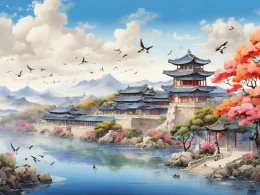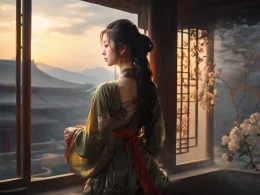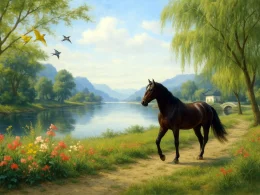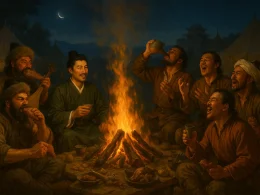The stream by my door has swollen these days;
My lover’s boat has stolen here often to gaze.
His boat’s too small for a crimson tent to be spread.
What can be done?
In vain we sigh where lotus flowers wed.
I’d be a lotus flower red,
Growing on autumn stream from year to year.
Would you be waves beneath the blossoms, dear?
Then without screen
You’d come and go with wind and rain, unseen.
Original Poem
「渔家傲 · 近日门前溪水涨」
近日门前溪水涨。郎船几度偷相访。
船小难开红斗帐。无计向。合欢影里空惆怅。愿妾身为红菡萏。年年生在秋江上。
欧阳修
重愿郎为花底浪。无隔障。随风逐雨长来往。
Interpretation
This lyric belongs to Ouyang Xiu's series of lotus-gathering poems composed to the popular Northern Song melody "Pride of the Fisherman." While adopting the folk song tradition's simplicity, it elevates a peasant girl's romantic longing through sophisticated literary imagery, blending rustic charm with scholarly refinement in characteristic Ouyang style.
First Stanza: "近日门前溪水涨,郎船几度偷相访。船小难开红斗帐。无计向,合欢影里空惆怅。"
Jìn rì mén qián xī shuǐ zhǎng, láng chuán jǐ dù tōu xiāng fǎng. Chuán xiǎo nán kāi hóng dǒu zhàng. Wú jì xiàng, hé huān yǐng lǐ kōng chóu chàng.
"Recent rains have swollen our creek so high—
His boat comes stealing by night, stealing by.
Too small our craft for crimson curtains' play…
No way, no way—
Beneath the love-tree's shade
In vain I sigh."
The stanza constructs an ironic hydrological metaphor: the rising waters (溪水涨) that enable secret visits simultaneously prevent full intimacy. The "crimson curtains" (红斗帐), traditional symbols of nuptial bliss, remain furled—their unopened state embodying constrained passion. The "love-tree" (合欢影), literally meaning "joined happiness," underscores the cruel paradox of physical proximity without fulfillment.
Second Stanza: "愿妾身为红菡萏,年年生在秋江上。重愿郎为花底浪。无隔障,随风逐雨长来往。"
Yuàn qiè shēn wéi hóng hàn dàn, nián nián shēng zài qiū jiāng shàng. Chóng yuàn láng wéi huā dǐ làng. Wú gé zhàng, suí fēng zhú yǔ cháng lái wǎng.
"Oh to be the river's red lotus bloom,
Rooted where autumn currents swell!
And you—the wave beneath my petals' loom,
No barriers to tell,
Chasing wind, riding rain,
In endless swell."
The metamorphic fantasy reveals sophisticated natural observation: lotus stems (菡萏) indeed sway atop water's surface while their roots anchor deep—an apt metaphor for the girl's desired state of both stability and freedom. The "wave beneath petals" (花底浪) imagery achieves perfect ecological symbiosis, their union dictated by natural laws rather than social constraints. The final meteorological verbs ("chasing wind, riding rain") liberate the lovers into elemental forces beyond human obstruction.
Holistic Appreciation
This lyric poem presents a poignant contrast between reality and longing. The first stanza narrates a scene, emphasizing the melancholy of "love unfulfilled," while the second shifts to lyrical imagination, transforming natural scenery into vessels of emotion. The structure is tightly woven yet fluid in transition—moving from the tangible "barriers of reality" to the intangible "yearning for union," revealing the rich inner world of a woman in love.
Blending scene and sentiment, reality and fantasy, the poem adopts the perspective of a lotus-gathering girl to portray the yearning, sorrow, and dreams within love. The imagery of "pink lotus blossoms" and "waves beneath flowers" merges seamlessly, painting a vivid aquatic romance. It combines the natural simplicity of folk songs with the refined artistry of literati poetry, epitomizing the graceful restraint of Song dynasty lyricism.
Artistic Merits
The poem’s most striking feature is its symbolic resonance and scenic metaphors. The poet employs natural elements like "pink lotus blossoms" and "flower-shadowed waves" to embody emotions, transforming abstract longing into tangible beauty. The language is fresh and melodic, with phrases like "chasing wind and rain" and "vain sorrow" carrying rhythmic and emotional charm. Moreover, the seamless shift from narration to lyricism creates a compact yet dynamic structure, rich in feeling without descending into cliché. This exemplifies Ouyang Xiu’s mastery in merging folk-inspired forms with scholarly refinement.
Insights
Through a woman’s voice, this poem captures the ache of "love hindered by circumstance" while nurturing fantasies of fulfillment. Its movement from reality to fantasy teaches us that even in life’s disappointments, we can preserve tenderness and poetry in our hearts. The poem also reminds us that emotions, though confined by reality, can find expression through nature—a testament to poetry’s unique power to console and inspire.
About the Poet
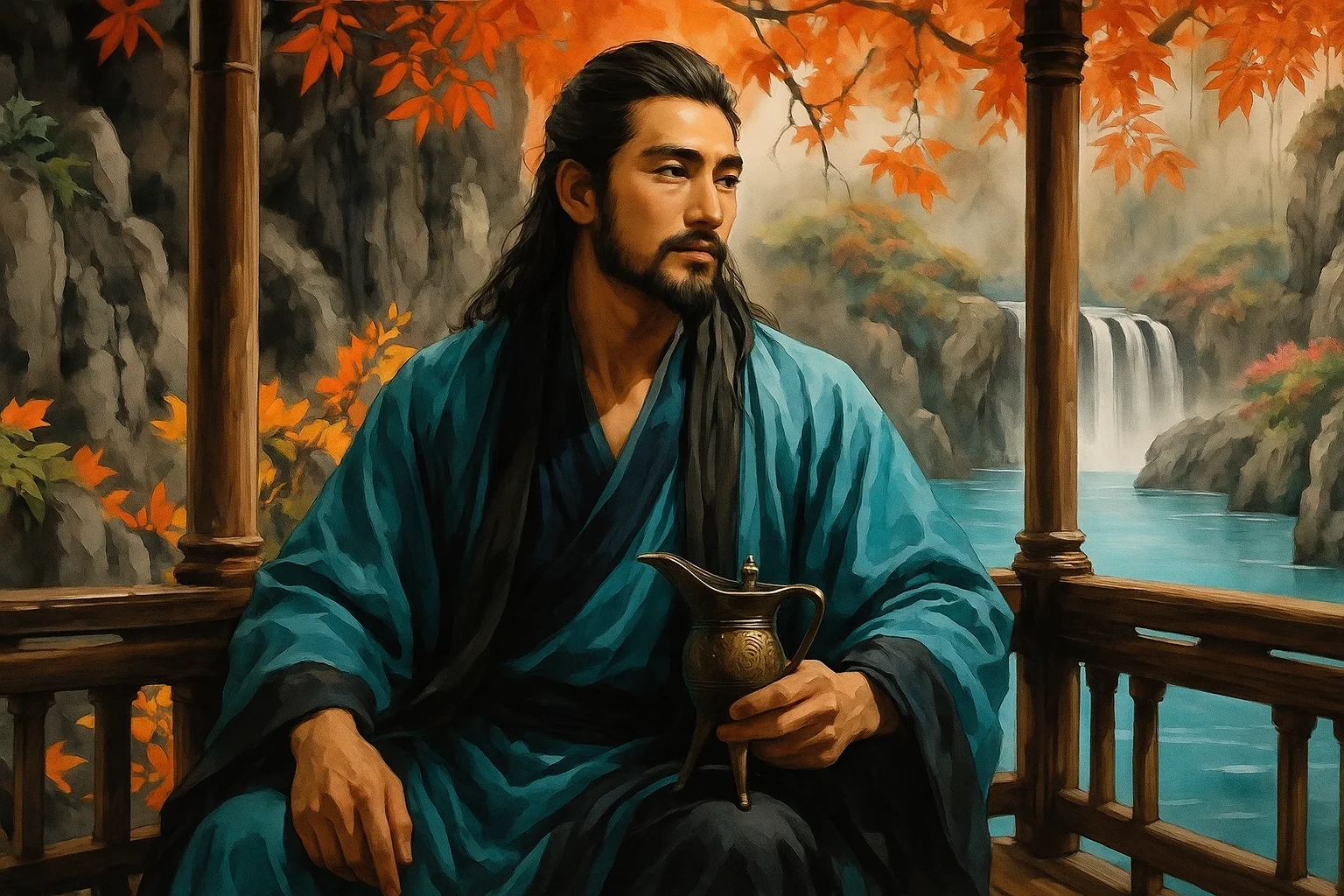
Ouyang Xiu (欧阳修, 1007 - 1072), a native of Yongfeng, Jizhou (present-day Jiangxi Province), emerged as the preeminent literary figure of the Northern Song Dynasty. After attaining the jinshi degree in 1030, he spearheaded a literary reform movement that rejected the ornate Xikun style prevalent at court. As a mentor who nurtured literary giants like Su Shi and Zeng Gong, he laid the foundation for the golden age of Northern Song literature. Recognized as one of the "Eight Great Prose Masters of Tang and Song," Ouyang stands as the pivotal figure in the transformation of Northern Song literary culture.









